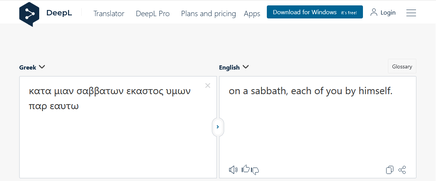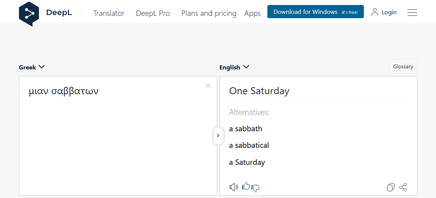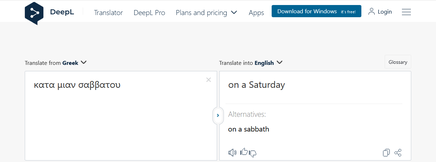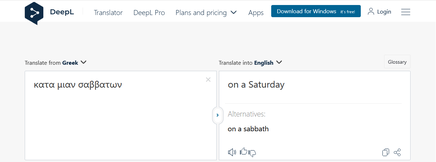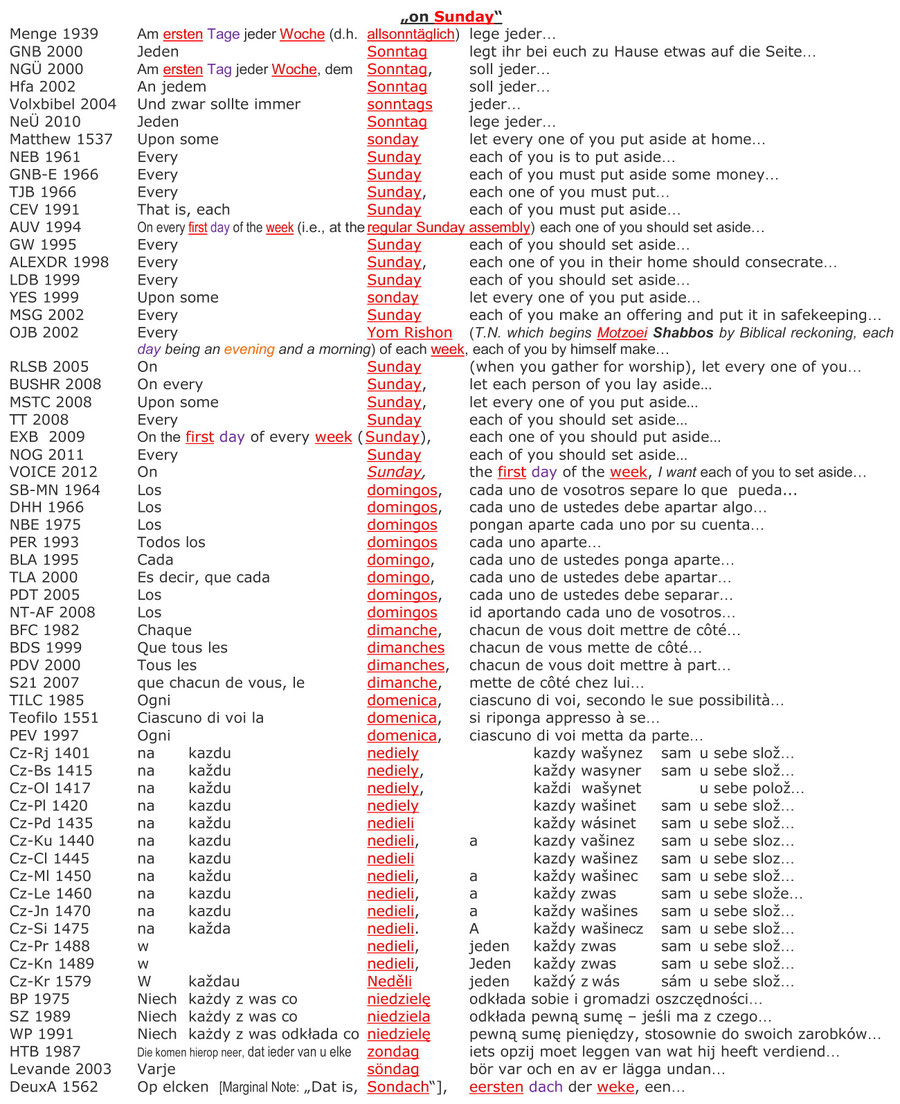- Home
- English
- Structure of the Bible
- Structure of the Menorah
- Ancient Menorahs
- Calendar and Feasts
- Resurrection on Sabbath
- Introduction
- Day
- Sabbath
- High Sabbath
- Pre-Sabbath
- Week
- Interlinear Bible
- Church Opinions
- 1. No Sunday
- 2. A Sabbath
- 3. No Friday
- 4. Intermediate Day
- 5. Three Days and Three Nights
- 6. Manipulations
- 6.1 Sabbath not Sunday
- 6.2 Plural σαββατων not week
- 6.3 one not first
- 6.5 Day of the Sabbaths
- 6.7 Lords Day
- 7. Old Bibles
- Greek Bibles
- Latin Bibles
- Gothic Bible
- English Manuscripts
- English Bible Prints 1
- English Bible Prints 2
- English Bible Prints 3
- English Bible Prints 4
- German Manuscripts
- German Bible Prints 1
- German Bible Prints 2
- Spanish Bibles
- Italian Bibles
- Swedish Bibles
- μια των σαββατων
- Mt 28-1
- Mk 16-2
- Mk 16-9
- Lk 24-1
- John 20-1
- John 20-19
- Acts 20-7
- 1Cor 16-2
- Lk 18-12
- 7 Languages
- Palm Sabbath
- Omer
- Summary
- The Rapture
- Rabbi Kaduri Note
- 666
- 888
- Video
- Info
- Historic Bibles Facsimiles
- Francais
- Deutsch
- Espanol
- Dutch
- Ελληνική
- Pусский
- Introduction
- Day
- Sabbath
- High Sabbath
- Pre-Sabbath
- Week
- Interlinear Bible
- Church Opinions
- 1. No Sunday
- 2. A Sabbath
- 3. No Friday
- 4. Intermediate Day
- 5. Three Days and Three Nights
- 6. Manipulations
- 6.1 Sabbath not Sunday
- 6.2 Plural σαββατων not week
- 6.3 one not first
- 6.5 Day of the Sabbaths
- 6.7 Lords Day
- 7. Old Bibles
- Greek Bibles
- Latin Bibles
- Gothic Bible
- English Manuscripts
- English Bible Prints 1
- English Bible Prints 2
- English Bible Prints 3
- English Bible Prints 4
- German Manuscripts
- German Bible Prints 1
- German Bible Prints 2
- Spanish Bibles
- Italian Bibles
- Swedish Bibles
- μια των σαββατων
- Mt 28-1
- Mk 16-2
- Mk 16-9
- Lk 24-1
- John 20-1
- John 20-19
- Acts 20-7
- 1Cor 16-2
- Lk 18-12
- 7 Languages
- Palm Sabbath
- Omer
- Summary
1Cor 16:2 - ON WHAT DAY WAS THE CHURCH MEETING?
1Cor 16:1-2: "Now concerning the collection for the saints, as I have given order to the churches of Galatia, even so do ye. 2 Upon the first day of the week let every one of you lay by him in store, as God hath prospered him..." - This is the text of the King James Bible (KJV), but the basic Greek text speaks of a different day, namely a Sabbath.
There are two important variants, namely the Alexandrian text type (Codex Sinaiticus, NA28) with the singular "σαββατου" (Sabbath) and the Byzantine text type (Textus Receptus, Majority Text) with the plural "σαββατων" (Sabbaths). Because of special language rules in the ancient Greek language, the plural also served to describe a single Sabbath day in the singular (see Definition and Interlinear Bible).
"κατα (kata; regarding) μιαν (mian; a/one) σαββατου (sabbatou; sabbath) εκαστος (each)..."
"κατα (kata; regarding) μιαν (mian; a/one) σαββατων (sabbaton; sabbath/s) εκαστος (each)..."
The translation into English is very simple: "concerning a Sabbath" or "concerning a Sabbath day..." or simply "on a Sabbath" or "on one of the Sabbath/s".
Six errors in a single sentence
The comparison of the Greek basic text with the King James Bible (KJV) shows that in order to justify the alleged congregation collection on a Sunday, six errors were made in a single sentence:
1. one (μια = mia) has been removed from the Bible (mia is a cardinal number)
2. first (πρωτη = prote) was added to the Bible (prote is an ordinal number)
3. sabbath/s (σαββατου = sabbatou and σαββατων = sabbaton) has been removed from the Bible
4. day (ημερα = hemera) was added to the Bible; a new day instead of the Sabbath day
5. week (εβδομαδα = ebdomada) was added to the Bible.
6. Sunday (ημερα του ηλιου or ηλίου ημερα = heliou hemera) was added to some Bibles
However, there are also numerous Catholic and Protestant Bibles that have been correctly translated (see below).
The facts about 1Cor 16:2
The last sentence in the Bible, where the "sabbath" was replaced by the "week", is in 1 Corinthians 16:2, and again the translation is very easy. In the basic Greek text there is not
"κατα (concerning) μιαν (one) πρωτη (first) ημερας (day) της (of the) εβδομαδας (week)...", but literally:
"κατα (concerning) μιαν (one) σαββατου (Sabbath) εκαστος (each) υμων (of you) παρ (aside) εαυτω (himself)..."
In Mk 14,12 it says: "τη (on) πρωτη (first) ημερα (day) των (the) αζυμων (unleavened bread)"." So, if Paul had meant the "first day of the week", he would only have had to replace the "unleavened bread" by the "week", a word that all Greek-speaking people knew (see week) and which itself was a component of the Bible, namely the Greek translation of the OT (LXX).
It is important to note that 1 Corinthians 16:2 speaks of the "Sabbath" in the plural (Byzantine text) and in the singular (Alexandrian text). So we are dealing here with a biblically clearly defined single day, the seventh day of the week, from Friday sunset on to sunset on Saturday. We are not at all concerned here with Sunday, nor with the "Day of the Lord", but with the Sabbath day.
The free Bible program ISA3 (Scripture4All, Link1, Link2) shows the literal translation and grammar, including the Concordant Literal New Testament (CLNT 1995):


"On one of the sabbaths let each of you lay aside by himself in store that in which he should be prospered..." (CLNT, Concordant Literal New Testament).
The Colored Scriptures translation displays the collection on a Sabbath in several languages:

The Google translation confirms the Sabbath or Saturday
Even the widely used Google translator knows the difference between Saturday or Sabbath and Sunday. If someone wants to say "on a Sabbath" or "on one of the Sabbaths" in the ancient Greek language, he must use the same words that Paul used:
The DeepL translation confirms the Sabbath or Saturday
Even more accurate than Google is the free online translator from DeepL it is about the Sabbath or Saturday:
Anyone who removes the "Sabbath" and inserts the "Sunday" here sins twice, because he takes something away from the Bible (what belongs to it) and he adds something new (what does not belong to it).
The changes in the Catholic Biblia Wujka
Dramatic are the mistakes that were made in the Polish Catholic Bible of Jakub Wujek (* 1541; † 1597). In the course of the centuries a variety of contradictory statements have arisen in only one Bible:

In order to avoid repetition, reference should be made to the explanations in the previous texts (Mk 16:2; Lk 24:1). It is interesting to note that the Sabbath mentioned in the chapter on the resurrection at Mk 16:9 (σαββατου) is exactly the same grammatical form as in 1Cor 16:2, which is found several times in the New Testament and in the Septuagint. It has been correctly translated as "Sabbath" or "Saturday" in most translations of the world. So why should it only be completely different with 1Cor 16:2 and mean Sunday? If God had meant that day, he would have said it; there are more than 20 options in the Greek language (see examples in No Sunday).
Many Bibles Teach the Collection on a Sabbath
It is amazing how many Bibles there are that have been correctly translated worldwide. How is it possible that today so few Christians know that the collection was "on a Sabbath" or "on a Saturday", as many German Bibles write? The answer is simple: many pastors cannot bear this message, so they recommend in their churches to read revised Bible translations that erase the day of God (Sabbath) and replace it with the desired pagan-Roman Sunday. This prevents unpleasant questions, because the basic Greek text and many other Bibles teach the Sabbath. The abbreviations of the quoted Bible translations are defined in the directory. The original copies of most Bibles can be downloaded as facsimiles from the Internet free of charge (see Historical Bibles).
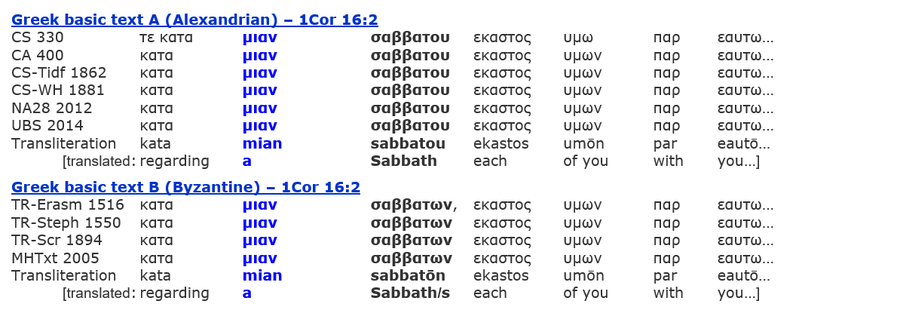



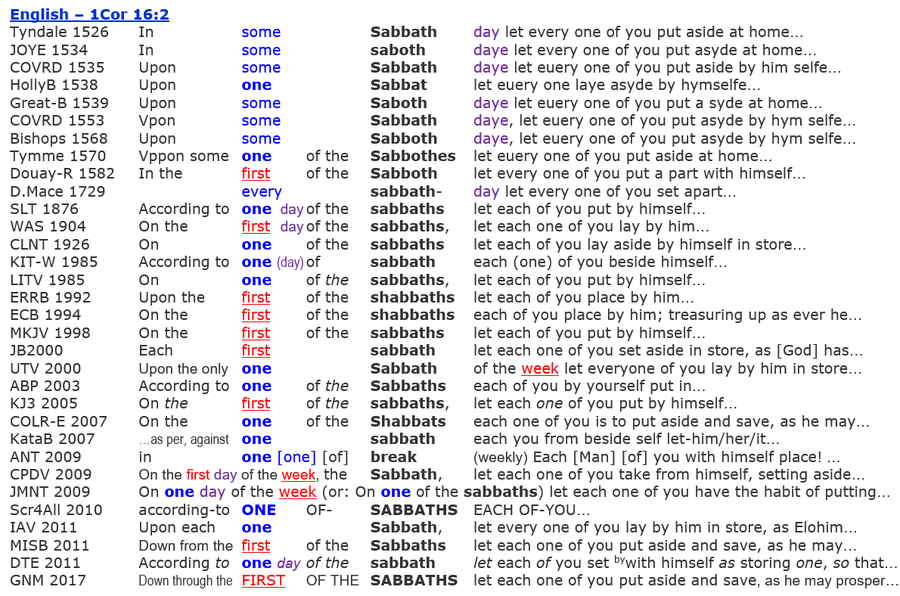









There are some Bibles that speak in general terms of "one day of the week", by which any day can be meant. But this is not correct, because God has clearly named the day of the gathering and collection with his name. He called this day "Sabbath" in the singular and plural, so that there are no misunderstandings. The corresponding Greek word for "week" was known to all people, but God did not want it to appear in the New Testament, so its mention in a Bible translation is always wrong.

Incorrect Translations that Erase the Sabbath in 1Cor 16:2
As can be clearly seen, a chaos of translations has developed over the centuries. It is absolutely impossible that the one basic Greek text offers two different assembly days, from which every Christian can choose one that he would like to have. This diversity of the most diverse and contradictory translations makes it clear that we can speak of a deliberate falsification of the Word of God. The closer we get to the coming of Jesus Christ and the Rapture, the more Bibles dare to erase the Sabbath from the Bible and replace it with the unbiblical word "Sunday". So far no human being has succeeded for 2,000 years in finding the corresponding Greek words for "after", "week", "Lord's day" or "Sunday" in the basic text of 1Cor 16:2.
And the reality is even worse, because some Bible programs even translate old correct German, Spanish, Italian, Swedish or Czech Bibles incorrectly (see old Bibles), because they now always turn „on a/first Sabbath/Saturday“ or „on the one/first of the Sabbaths/Saturdays“ into „on the first day of the week“ or „on a Sunday“. In concrete terms, this means that not only the statements of the ancient languages Greek and Latin are being falsified, but also those of the modern languages, where Bibles that have already been correctly translated into national languages are being falsified again. Apparently, you cannot speak of a Sabbath or Saturday in any language in the world because it supposedly always means „on the first day of the week“ or „on a Sunday“. This shows how demonic the whole thinking of some people is. They cannot be convinced by arguments, but want to see Sunday in the Bible with all their might and by force. They come up with the craziest arguments just to seduce the Bride of Christ and take her away from God's biblical calendar with its feast days to ancient pagan feast days that are not mentioned once in the entire Bible. However, very many international Bibles speak of the collection for the church on a Sabbath or on a Saturday (see above). Nevertheless there are also bad examples which are shown here:
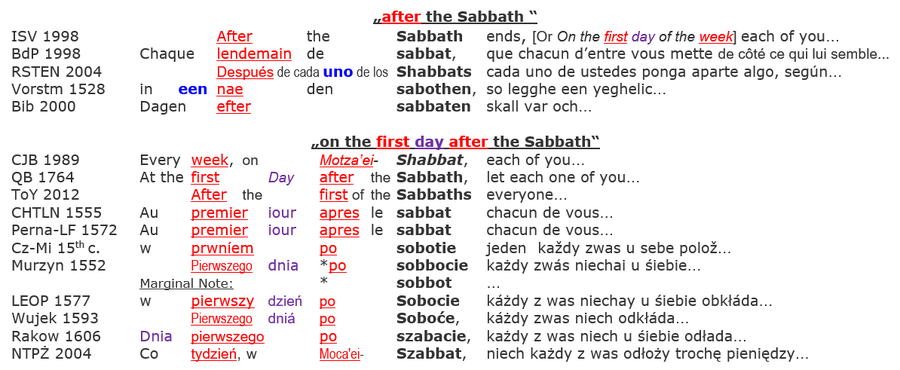



For the list of abbreviations of the Bibles see link. The original copies of most Bibles can
be downloaded as facsimiles from the Internet free of charge
(see Historical Bibles).
"Prove all things; hold fast that which is good. Abstain from all appearance of evil"
(1Thess 5:21-22)
"Take no part in the unfruitful works of darkness, but instead expose them"
(Epheser 5:11)




